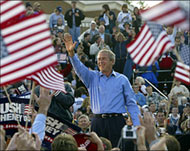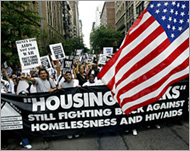Land of the elite and home of the rich?
George Bush and John Kerry are members of an exclusive club – those with considerable personal fortunes who have the backing of the super-rich.

As the pair square off in a series of presidential debates, the race for the White House is still too close to call.
But one thing is certain: the next US president will be a member of America‘s wealthy elite and will be endorsed by around only 30% of the country’s voting population.
Critics say that history proves the US president is always a rich white man who governs the country on behalf of moneyed special-interest groups rather than the American people.
They claim the influence of “big money” in US politics is undermining the concept of democracy itself.
So much so that around 50% of Americans will not bother to vote in November’s elections because of the alienation they feel from the electoral process.
Worrying influence
Ted Lewis, of San Francisco-based human rights group Global Exchange, says the influence of affluent special-interest groups on US politics is “worrying”.
“Realistically you have to be wealthy or at least have access to wealth to be a serious candidate for president,” he told Aljazeera.net.
“TV advertising, which is the only game in town, is very expensive and political parties need to have plenty of money to target the 14-18 key battleground states with their advertising.”
|
“Realistically you have to be wealthy or at least have access to wealth to be a serious candidate for president” Ted Lewis, |
According to the Washington-based Center for Public Integrity, John Kerry and his wife have a disclosed wealth of $747 million, while President Bush has assets of $18.9 million.
Both have raised millions in campaign contributions from the likes of Harvard University and Citigroup (Kerry), and Price Waterhouse Coopers and Merrill Lynch (Bush).
Critics say campaign contributions are a form of legalised bribery and make it inevitable that candidates will represent the interests of those who fund them.
They point to alleged conflicts of interest such as the award of lucrative Iraq contracts to oil-services company Halliburton, formerly headed by Vice-President Dick Cheney and a major Republican party donor.
Or the political power wielded by the American Israel Public Affairs Committee (AIPAC), whose board members contribute significantly to campaigns and political committees, and which includes top fundraisers for both Kerry and Bush.
Florida controversy
However, Patrick Basham, an elections expert at the Washington-based Cato Institute, says big money’s involvement in US politics is not as pernicious as some make out.
“The money a candidate raises is a reflection of the market there is for his ideas,” he told Aljazeera.net.
“This is a very rich country and lots of people will pay large sums to further their agenda. But I would argue that this serves to educate the public.”
 |
|
Both Bush and Kerry campaigns |
Basham says that research proves there is no connection between money given to campaigns and subsequent voting patterns in the US Congress.
“Most politicians vote on their own agendas and ideals,” he said. “And the contributions are not that large – there are restrictions.”
It was events in Florida four years ago that really got the world worried about American democracy.
The US presidential election in 2000 was one of the closest elections in history.
Florida‘s 25 electoral votes ultimately decided the election by a razor-thin margin of actual votes, and were certified only after numerous court challenges and recounts.
Missing criteria
The Florida election has been closely scrutinised since then as several irregularities are thought to have favoured Bush.
These included a purge of 50,000 alleged felons from the voting rolls that included many voters who were eligible to participate.
Four years on, many believe that things have not significantly improved.
Former US president Jimmy Carter, who led a commission to recommend changes in the American electoral process, says “some basic international requirements for a fair election are missing in Florida“.
|
“The money a candidate raises is a reflection of the market there is for his ideas. This is a very rich country and lots of people will pay large sums to further their agenda. But I would argue that this serves to educate the public” Patrick Basham,Cato Institute |
He says Florida voting officials have proved to be highly partisan, and that a fumbling attempt has been made to disqualify 22,000 African Americans (probable Democrats), but only 61 Hispanics (likely Republicans) as alleged felons.
However, many commentators feel that those who concentrate simply on the minutiae of voting irregularities are missing the point.
They say the main issue is that the public are denied a real choice before they reach the voting booths because big money is being used to perpetuate the incumbent class.
And they argue the exclusivist nature of US politics is the main reason large numbers of people in America do not vote.
In the 2000 presidential elections, only 54% of potential voters cast their ballots, with George Bush winning after receiving the backing of only 27% of the voting-age population.
Voter apathy
Global Exchange’s Ted Lewis says voter apathy is a major threat to US democracy.
“People don’t vote because they feel detached and they don’t feel that voting will make a difference,” he said.
“It is usually the poor and desperate who don’t vote while the wealthy vote in very high numbers.
“I think the only way to break this vicious cycle is at the grassroots level by concentrating resources on the poorer areas and educating people in these communities about their rights.”
 |
|
Millions of poor Americans do not |
But the Cato Institute’s Patrick Basham says there are other reasons Americans don’t vote.
“There are certainly people who are disaffected but they are a minority. Others, for example, are deterred by the lengthy process required to register to vote.”
“What sets America apart from other countries,” he added, “is that many people simply don’t see politics as an intrinsic part of their lives.
“And I would argue that people who are not obsessed by politics are not necessarily a bad thing.”
Whether former US president Abraham Lincoln, who lauded the merits of “government of the people, by the people, for the people”, would agree, is open to debate.